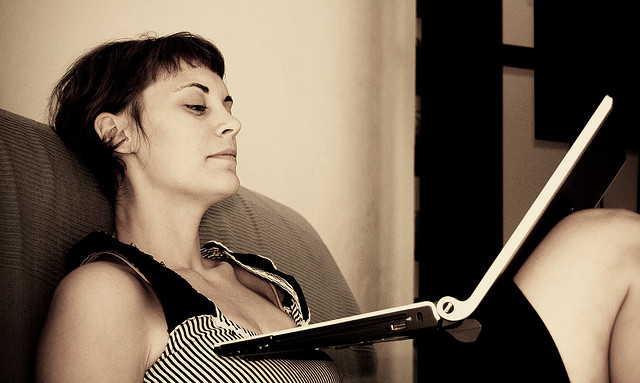A typical member of the Millennial Generation, I began my career at a time when mobile had only begun to impact the daily lives of working professionals.
Clearly, I was unprepared for what was coming—constant availability of work-related information (ranging from e-mails to cloud documents) made me into someone I’d never suspected I could become.
With my eyes constantly glued to the screen of a smartphone or tablet—at some point, I simply had to stop and try to register a boundary between work and life. But it’s not something I realized that easily—after all, my friends and colleagues were leading similar lives.
The moment I noticed that something was not right with my attitude towards work, was when I caught myself checking my inbox during “Odile’s Coda” from the third act of Swan Lake. I finally had the opportunity to admire Peter Morton’s fantastic interpretation of my very favorite ballet, but here I was—missing out on the finest moment in the piece, just to see whether I received any updates.
Needless to say, I decided that I’ve had enough, and that I want to regain the ability to fully enjoy every moment in my life—including those that happen outside work!
Here are eight little things that helped me to build an equilibrium between my career and personal life:
1. I embrace the “off” button.
I finally accepted that the “off” button is there for a reason. Since I mentally panicked at the thought of turning off my devices, I decided that distancing myself from technology can only happen in phases.
At first, I avoided bringing the phone to the table during meals. On vacation, I was careful not to bring my tablet to the beach—even if it was just to read a book—my email and work documents were just a few clicks away.
My gradual unplugging gave me a fresh perspective and a new analytical clarity that actually helped me to achieve goals which seemed out of my reach before. I found it amazing to discover that technology, for all its helpfulness, can also blind us to simple solutions.
2. I keep a schedule, but also enjoy unscheduled moments.
When pursuing my equilibrium, I learned that scheduling is often misunderstood as an activity that helps us maximize our productivity.
Instead, I started to understand it as something we do to help ourselves juggle several things at once, while trying to leave enough time off for reflection, relaxation and creativity.
One of the most important lessons for me was treating non-work commitments as seriously as professional ones—the time spent with family, friends or on our hobbies should be just as inviolable as work time.
3. I am honest with myself.
And just like they say—it does hurt. Every week, I forced myself to do a review of my activities, and I asked myself this crucial question: Am I happy?
I think if we avoid facing the hard questions, we might never really get to know ourselves or determine what we want our lives to be like. I realized that there’s something wrong with my attitude towards work, when I asked myself: Who will I be five years from now?
I was honest with myself—I didn’t see a woman living her life passionately. I envisioned a miserable creature, overwhelmed by a burden of professional responsibilities—a woman who didn’t live her life to the fullest.
Unfortunately not many people dare to ask themselves such questions and just go on without even thinking about alternative approaches. By facing my expectations and examining myself, I learned that there’s no universal recipe for a work-life balance—it’s what we make of it individually.
4. I recognize that “free time” and “available time” aren’t the same thing.
Just because I don’t have anything planned for Wednesday evening, doesn’t mean that I’m free to accompany my colleagues to a company event.
We schedule our time to make the most of it, but a professional invitation—which would have perfectly occupied my unscheduled chunk of the day—made me realize something really important.
Unscheduled time is more than just a section of unoccupied space in our lives.
It was a real eye-opener when one of my colleagues automatically assumed that I’d be coming to an informal office gathering, when I said I had no plans for Friday night. By recognizing this, I’m now able to turn down many work-related invitations, in order to enjoy my free time in creative and inspiring ways.
5. I reside closer to my workplace.
I know it sounds strange, but moving really helped me to establish a healthier work-life balance. By living close to my workplace, I didn’t have to spend so much time and money on the commute. Plus, I could finally avoid being stuck like a sardine in the crowded subway every morning.
All in all, this change helped me realize that it was the commute that drained me, even mores than my actual work, and I had never even considered it as a significant factor in my work-life balance.
6. I accept imperfections.
We all make mistakes. Life is often about facing challenges and obstacles, that pop out of thin air, and demolish our neatly ordered schedules. Whilst examining my attitude towards work and achieving work-life balance, I finally realized that I don’t need to have it “all together” at all cost.
One of the things I’ve always disliked myself for is my perfectionism. Much of my time at work was lost on improving things that rarely ever got recognized. So instead of being constantly dissatisfied with my performance (all perfectionists out there know what I’m talking about), I decided to focus on being present and productive.
Good prioritization is key to keeping ourselves on the right track.
7. I re-examined my options.
Sometimes we get stuck in our rhythm of life, and it’s easy to pass on new, interesting opportunities, which have the potential for completely shaking up our work-life balance—in a good way!
Many workplaces today offer flexible schedules where at least part of one’s responsibilities can be done from home. When I heard that one of my colleagues was trying an alternative work scheme offered at my office (others preferred to stick to the old schedule at all cost), I decided that having a go at it myself might be a good idea. Needless to say, I soon embraced a new work style and enjoy working from home one day a week.
I found myself becoming calmer and more organized—being out of office provided me with a radical change of environment, which in turn powered my creativity and satisfaction. It’s true that breaking the routine can sometimes help us to see clearly our work habits and assess whether those are still acceptable to us.
8. I simply initiated making a change.
For many people this is the single most difficult thing to do.
Initiating our transformation into a healthier and happier individual isn’t easy, but instead of procrastinating or waiting for the “right time,” we should look straight towards our goal and plunge right in.
This needs to be our own conscious choice, and this choice needs to be followed by action. I know it sounds scary, but I’ve been there, and I’ve learned that it’s definitely worth it.
Changing my attitude towards work has been essential in revolutionizing my ideas on how to achieve balance, between my personal life and professional life.
Although it took me more than a year, the transformation I managed to achieve, while developing a healthier work-life equilibrium, was noticed by my friends and family—and even by my colleagues!
By learning how to set boundaries in a way that suits my preferences and needs, I’ve finally found the time to become the person I want to be.
Relephant:
The Truth About Work/Life Balance—How to Really “Have It All.”
Author: Torri Myler
Editor: Yoli Ramazzina
Photo: Flickr/Alessandro Valli












Read 0 comments and reply